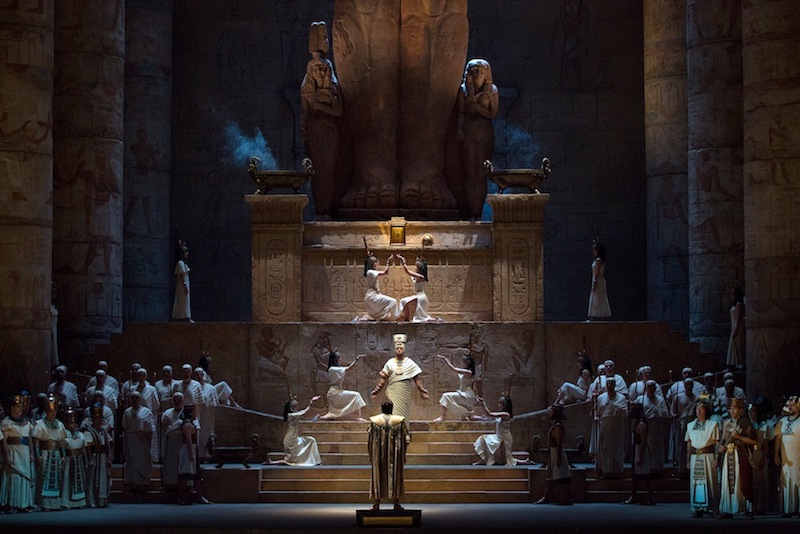With a stale third cast and conductor, Met’s “Aida” buried, not quite alive
Verdi’s Aida is one of the most beloved works in the operatic oeuvre, a classic example of opera at its grandest. At the Metropolitan Opera, Sonja Frisell’s 1988 production has achieved iconic status as perhaps the most extravagant piece in the company’s current repertory.
Why is it, then, that Met revivals of the opera often feel as though they’ve been dug out of the back of the freezer? A new cast often brings the promise of a fresh point of view, but Thursday’s performance, which featured new principals and a new conductor, felt every bit as rickety as last October’s incarnation.
Though the glam staging did its part, very little else went right Thursday evening. The Met orchestra, one of the finest and most responsive ensembles in the world, had all the grace of an oil tanker with Plácido Domingo at the helm. Leaving aside the slew of ensemble issues that plagued everyone, the company’s much-lauded chorus was unsure of pitch and lacking in gusto.
Aside from two glimmers of light, a weak late-season cast provided little relief. Mark Delavan’s solid, woolen baritone ennobled the antagonistic role of Amonasro, which he played with unflagging energy. Štefan Kocán made a strong impression as Ramfis, booming out the priest’s role with authority.
Otherwise, performances ranged from inconsistent to brutal. Ievgen Orlov, in his defense, was probably miscast as the King. He did some very fine work during the second act’s famous triumphal scene, but the King’s first appearance sits extremely low, and casting a bass who can’t bellow the bottom notes with authority–which Orlov can’t, or couldn’t on Thursday–is asking for trouble.
Violeta Urmana was beset by wobbles and shrillness in much of her singing as Amneris. She was at least more animated than some of her peers, though most of that was old-opera mugging: fainting into a wall, lifting her chin disdainfully, and the like. The true humanity of her character came through in her final scene, earning cheers, but coming too late to create a fully nuanced portrayal.
Her rival struggled just as much, if not more. Oksana Dyka, who debuted in last season’s Prince Igor, sang the title role and sounded as though she might be suffering from allergies. She struggled to focus her tone, and when she did, it had a steely edge. When she had to venture into her chest voice her sound vanished entirely. Her show-stopping aria, “O patria mia,” was received with polite indifference.
The roughest night of all, though, was had by Marco Berti, whose struggle as Radamès was unpleasant to behold. He muscled his way to a few clear high notes, but then, he muscled his way through everything else as well, attacking the role with a cudgel. He did almost as much shouting as singing, and gestured only vaguely in the direction of true pitch–in his final duet with Aida, his intonation was impossibly wide of the mark, leaving a sour taste as the curtain finally came down.
Stephen Pickover added little with his limp stage direction, allowing the first three acts to become 24-carat camp. Berti reacted to the discovery of his treason with an awkward shuffle and a face palm, and a supernumerary in the palace attacked her harp with enough violence to snap the strings. The chariot horses, as ever, behaved like true divas in the triumph scene, shaking their harnesses with impatience and snorting for attention. If there’s a silver lining to performances like these, it’s that they make us appreciate the greatest nights at the Met all the more.
Aida runs through April 20. metopera.org

Posted Apr 12, 2015 at 3:27 am by Franco Bastiano
Please MET stop engaging Domingo both as a singer and a conductor. Or does he pay for being engaged? His time is over and his singing and conducting are both unbearable meanwhile.
Cordialmente
Franco Bastiano
Bologna